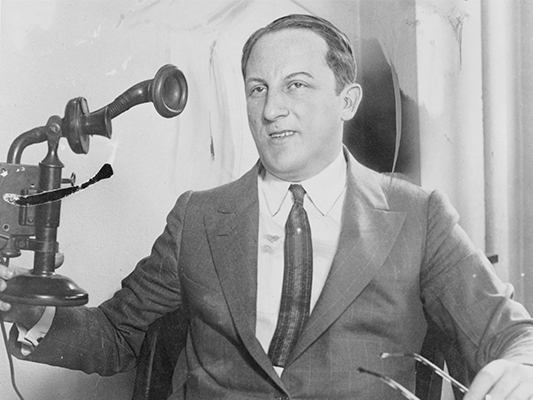Arnold Rothstein

Born: January 17, 1882, New York City
Died: November 6, 1928, New York City
Nicknames: The Brain, The Fixer, the Big Bankroll
Associates: Charlie “Lucky” Luciano, Meyer Lansky, Dutch Schultz, Jack “Legs” Diamond
Arnold “The Brain” Rothstein may have done more to corrupt sports – and, inversely, encourage reforms – than any other single person in the early decades of the 20th century. Rothstein always denied it, but he was the man suspected by many of engineering the Chicago “Black Sox” baseball scandal, when players threw the 1919 World Series.
Rothstein had a hunger for gambling, especially casinos games, cards and horse racing, but he also used an extensive network of advisers to limit the uncertainty in the results of his wagers. He was accused of engineering the outcomes of many horse races, for example. He reportedly operated an illegal casino in Manhattan.
He was indicted but never convicted of fixing the 1919 World Series and always insisted that although he made some money gambling on the result, others, perhaps using his name, had actually compromised the Chicago White Sox players. Testimony from a number of White Sox players delivered to a grand jury mysteriously disappeared, and none of the players (eight of whom, including the famous Shoeless Joe Jackson, were banned from baseball for life) would testify during the actual trial, citing Fifth Amendment protections against self-incrimination.
Prohibition helped Rothstein reach new heights of power and income. Rothstein was quicker than some of his mobster colleagues to see the huge profits that could come from illegal sales of banned alcohol. Notably, although Rothstein was often considered a professional, even corporate, member of the Mob, he was also unafraid to use his connections with violent New York City street gangs to further his business interests.
Rothstein was a major player in the growing East Coast Mob syndicates before and during Prohibition, until he was gunned down on November 4, 1928, at the Park Central Hotel in Manhattan. Some blamed the murder on a poker player to whom Rothstein owed a $300,000 gambling debt. Although it took Rothstein a day to die, he refused to tell police who did it, and the gambler was never charged.
His death — and the breakup of Rothstein’s New York City-based criminal association — helped pave the way for reformer Mayor Fiorello La Guardia to take office.
Rothstein has inspired many characters in novels and films, appearing in Damon Runyon’s short stories, F. Scott Fitzgerald’s classic novel The Great Gatsby, the films Eight Men Out and The Godfather, Part II, and the television series Boardwalk Empire.




